Crawling Back: Amazing Fantasy #15 Review
This essential issue dictates one of the most powerful origin stories in all of comics, a genuine classic even 60 years later
—by Nathan on January 1, 2024—
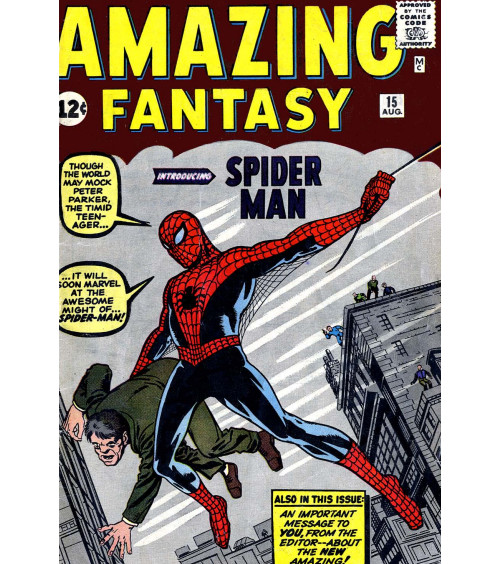
Can't believe it's taken me this long to write about this issue.
This is not a hard and fast rule I follow for this site, but I generally enjoy posting blogs in a way that makes some kind of logical sense. It's why I'll post a "(Strand)om Stories" review of a Moon Knight collection shortly after posting a "Spider-view" review on a story featuring a team-up between Spidey and the vigilante; it's why I'll do a series of "Crawling Back" posts on each Sinister Six member after reviewing a team appearance. Heck, for a series called "Random Reviews," I've been following a bit of an order lately, running sequentially through some original Image Comics series. I like crafting connections between blogs, feeding them into each other. It makes commentary more fun.
For this issue–this very, very important issue–I've been looking for a perfect opportunity...or a near perfect opportunity I often don't stress too much about bouncing blogs off each other seamlessly, which is why I reviewed a volume of Stan Lee's Avengers after they popped up briefly in an Amazing Spider-Man issue starring the Sandman; in other words, I appreciate logical, narrative, and even chronological tethers existing between posts, but they don't need to have the tensile strength of a bridge cable. But for this issue–this very, very important issue–I wanted something more pertinent. I thought my recent examination of Spidey's 30th anniversary made for an appropriate opening. Having examined where Spidey was in August, 1992, we get to turn back the clock and see where he came from in August, 1962.
I have ulterior motives for writing about this now, of course, which will be made apparent in the coming weeks and months. But if I'm being brutally honest, I always knew "Crawling Back" would be the platform where I discussed this issue at length. It's not like I had a catalog of issues in the back of my brain I knew I wanted to review when I initially developed the series, but very early on, I realized never discussing this cornerstone issue would be, to momentarily hyperbolize, a travesty.
Don't expect to hear anything astoundingly new. I'm not here to add some startling new line of thinking to the discourse of Amazing Fantasy #15. As I wrote in my Watchmen review, I'd rather not compete with other writers when discussing a narrative that's been picked apart for decades. But as Brandon Sanderson once said in a 2008 lecture to students at Brigham Young University, the most important aspect a writer can weave into their work is their unique perspective. So, yeah, you've probably read a dozen Amazing Fantasy #15 reviews–heck, you may have even read Amazing Fantasy #15 a dozen times–but you've never read my review. Hopefully, whatever perspective I offer is unique enough for you to enjoy as we analyze how Stan Lee and Steve Ditko used this classic issue to begin spinning a web for our pal Peter Parker.
Seems like a good way to kick off the new year.
"Spider-Man"
Writer: Stan Lee
Penciler: Steve Ditko
Inker: Steve Ditko
Colorist: Stan Goldberg
Letterer: Artie Simek
Issue: Amazing Fantasy #15
Issue Publication Date: August 1962
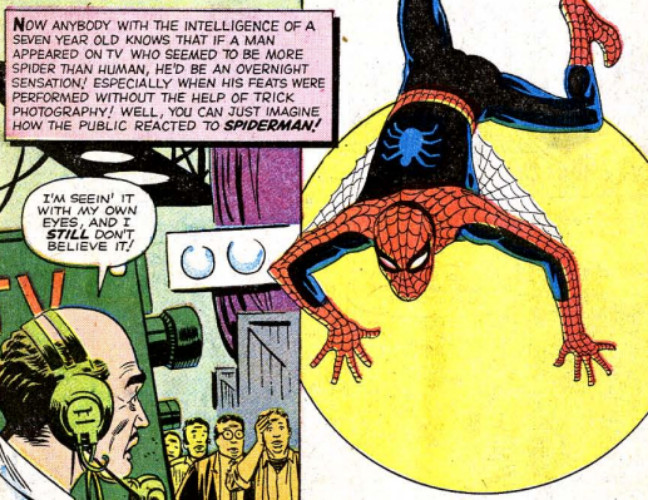
It's a timeless tale. Many of Lee's origins are. Though unnecessarily verbose, his earliest issues for many of his characters remain surprisingly intact several decades later–not much has changed about the origins for the Fantastic Four, Iron Man, the Hulk, Daredevil, or Doctor Strange. Yes, the location where Tony Stark was injured has been updated, but he's still a mogul with a heart condition (in more ways than one). Yes, readers learned Bruce Banner had some festering rage inside him which the gamma bomb unleashed through the Hulk, but he's always been a victim of radiation. Matt Murdock has always been blinded, even if Frank Miller updated the exact circumstances of Daredevil's first forays into superhuman action. The core tenets remain the same.
How much truer for Spider-Man.
What makes Amazing Fantasy #15 so surprising is that its lead feature, the origin of Spider-Man, is only 11 pages long. It shares space with three other stories, but compared to narratives about a guy trapped in a sarcophagus and teleported to ancient Egypt or an old bell-ringer who may or may not be abducted by aliens, Spidey's origin stands out. I'm not even going to talk about the other three narratives beyond that brief mention. It's impressive that such a powerful story can be concretely told in the space provided Lee and Ditko. This isn't the modern day where Brian Michael Bendis devoted six whole issues to tell basically the same story in Ultimate Spider-Man. There's no padding here. The whole piece is remarkably straightforward.
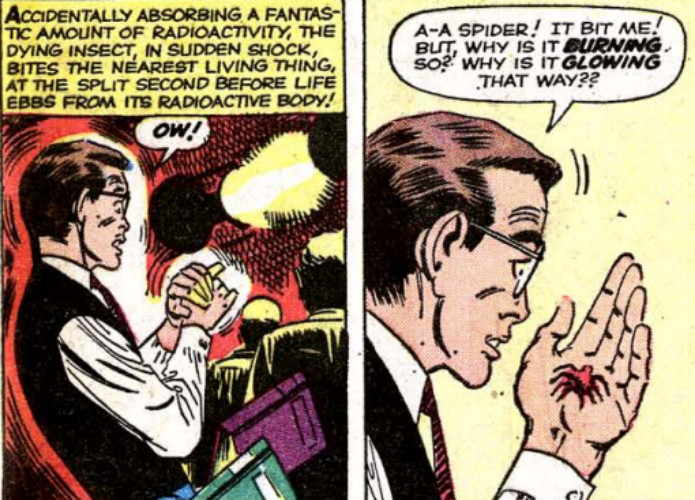
Spidey's origin, in comparison to heroes such as Superman or Batman, places weight on its central character's morality and actions over happenstance. To be clear: the loss of one's parents is an enormous tragedy and serves as a compelling incentive for Bruce Wayne to dedicate his life to fighting crime in Gotham City…to say nothing about realizing you’re the last member (more or less) of an entire alien civilization. But it's exterior forces which propel DC's top dogs to embrace their destinies. Superman just happens to have crash-landed on a planet where he has powers–later versions of his origin would stress the moral responsibility Clark Kent fulfills as Superman, instilled in him by his parents, more convincingly making his superhero career a choice the reader can wrestle with alongside him. For Bruce Wayne, the choice to continue being Batman despite setbacks and losses supersedes his original incentive–again, more modern myths have plumbed the depths of his psyche to a greater extent, creating in Bruce a reason to be the Dark Knight Detective beyond avenging a horrible tragedy which happened when he was a kid.
But for Spider-Man, choice is infused from the get-go. Yes, he too is the product of circumstance–Peter Parker just so happens to be at a science exhibit when a spider is jolted with radioactivity and bites him. Yet, outside of that brief twist of fate, the choices in this issue are all Peter's. He's responsible for his decisions just as much as he's responsible for the outcomes. He doesn't determine the powers he receives, but he chooses how they're used.
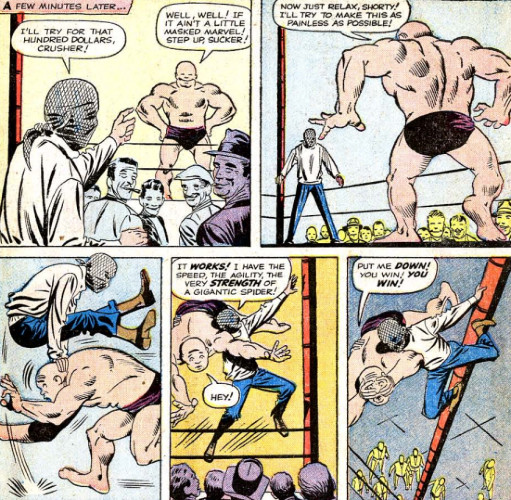
Lee smartly undercuts the general notion that all people who suddenly gain powers would automatically use their abilities for the good of those around them. Peter Parker, though not gratingly selfish, chooses to utilize his newfound powers for his own gain. Ditko is allowed some space for Peter to take joy in his abilities before throwing him into the ring as he faces down the man-mountain known as Crusher Hogan. But from the start, Peter’s aims are centered on himself–yes, the powers are fun, but he plans on using them for his own benefit and improvement. He takes pride in his intelligence when he designs his web-shooters ("[O]nly a science major could have created a device like this!" he crows), realizes he's different from the peers who previously snubbed him, even notes May and Ben's ignorance when they offer him crackers and milk. He's more than just their favorite nephew now. They can dote all they want, but they can't fully understand where he's at. As a note, Peter doesn't resort to the "they’re too frail to know the truth" argument Lee would later instill in him; this feels more like Peter's on a new level of individuality and power a couple of gray-haired folks wouldn't be able to comprehend, showcasing something of a generational divide I'm surprised Lee wouldn't lean more fully into in later issues.
It's been a while since I read this issue, and I think heading into it, I was influenced by the original Sam Raimi film. In that narrative, Peter's aims are financially motivated (and that may work itself into other retellings or adaptations of this issue, I just don’t remember), hoping to make enough money to purchase a car to impress the girl next door, Mary Jane Watson. I guess I assumed the same would be true here. It's not. Peter never mentions money as a motivation–yeah, he's paid $100 bucks when he defeats Crusher and takes on television gigs, but he initially fights Crusher as a way to test his powers. When reporters and publicists begin pressing for interviews, pictures, even movie deals, Spidey pushes past them all. That same panel indicates Peter "breathes the first sweet scent of fame and success." Sure, money would probably have come with the fame and success, but it’s not Peter's goal.
I think Peter wants to be noticed. Appreciated. Loved, even.
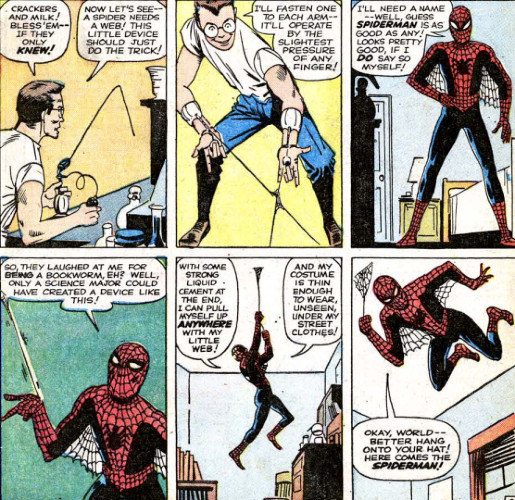
Here's this down-on-his-luck nerd who can't get anyone to go to a science exhibit with him, who, when he gets his powers, wrestles a dude, not for the money, but to test his strength and speed. He disguises himself initially, not to adopt a persona, but because he doesn't want anyone to see his face if he fails. He doesn't want people laughing at him anymore. When he's abandoned by his peers at the issue's beginning, he heads to the exhibit alone, swearing that "One day I'll show them…they'll be sorry…that they laughed at me!" Pete's got a massive chip on his shoulder, and these abilities are his chance to break out of the mold life and his peers have boxed him into…but he takes precautions to control how he's seen, just in case it doesn't work out. The mask isn't supposed to protect his face or his loved ones because he's afraid of putting anyone in danger…it's to remain anonymous in a society that's already labeled him and would target him for stepping outside his prescribed "box," especially if he failed. Wouldn't it just be like "puny Peter Parker" to act big and tough just to fall flat on his face? This way, he gains fame without the potential humiliation. And he can become a little arrogant without worrying about disappointing anybody.
As I said, Peter isn't grating or even overly annoying, but as we move deeper into the story, we do realize (especially with decades of hindsight) that he's not handling the situation as he should. He's a kid who just won the genetic lottery; what teenager his age would handle such abilities wisely at first? Peter gains an ego boost–possibly bolstered by his anonymity–which plays out when he chooses to not stop a fleeing burglar. In the throes of his new abilities and the attention he's receiving, Peter turns sharply inward, ignoring that he could use his powers for the benefit of others. "I just look out for number one," he tells a flustered security guard, indicating himself. We get that Peter's a likeable, intelligent guy who's been treated poorly. It's why we can understand his behavior at this moment…we don't "excuse" or "ignore" how he acts, but we see why. We can comprehend how Peter is embracing the new status his powers bring. And were the effect of Peter's actions harmless, we could probably shrug our shoulders a little. Yeah, Spider-Man let one crook go. Big deal, right?
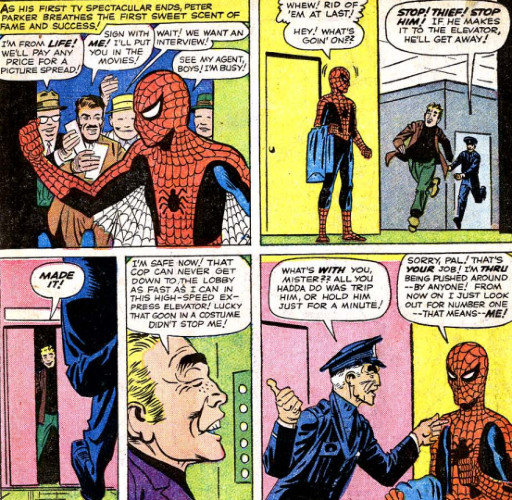
But if you've ever read this issue or a myriad of other Spidey issues or seen any of the numerous Spider-Man adaptations across film, television, and games, you know that isn't the end of the story.
So let's discuss Uncle Ben.
Uncle Ben's a weird character. No, Ben himself isn’t weird, but the function he fulfills is odd. The impact of the character extends far beyond this single appearance, and we've learned more about him over the years through flashbacks, stories from Aunt May, and the occasional dream sequence or ghostly appearance. Who he is to Peter lies more in the unspoken history Lee and Ditko indicate Ben and Peter have (or the history later writers develop) rather than who he is in this issue. He pops up in five panels and speaks a total of twenty-seven words in only two of those panels. And yet it's his death which catapults Peter to take a more proactive stance in how he uses his powers; it's his death which has haunted Peter for the last six decades; it's through his death Peter learns that all-important lesson of great power and great responsibility. We learn virtually nothing about Uncle Ben other than he's an older gent married to May who cares for his teenage nephew. And yet, successfully, Lee makes him the cornerstone upon which Spider-Man is constructed. When Peter learns of Ben's murder, we feel the same rage; when Peter learns the burglar who shot Ben is the same man Peter let go earlier, we feel the same pangs of guilt.
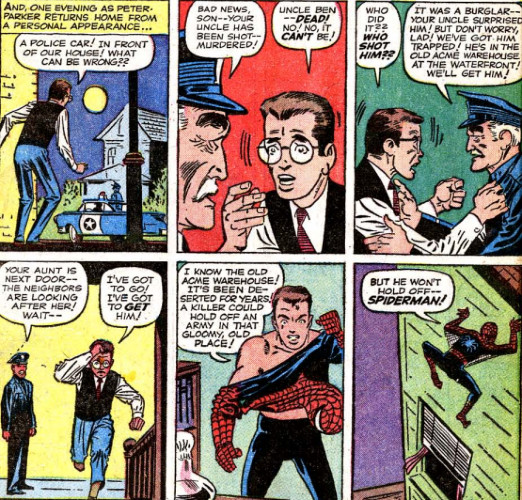
The complexity Lee manages to pull from Ben's death is impactful. Upon learning Ben's been killed, Peter flies into a rage, hunting down the criminal responsible and cornering him. This, too, is a self-centered reaction; again, it's an understandable reaction, but it isn't motivated purely by justice. Peter hunts down the shooter to avenge his uncle's death. "You’ll never escape again, murderer!" he shouts before attacking the man. There's no sense of justice here, no sense that Spidey has altruistic motivations in stopping this guy. This is revenge, pure and simple. Like many of his other actions, Peter is guided by his own will. "I’ve got to get him!" he yells, stressing he's the only one capable of doing so. We don't know what Peter's going to do. He doesn't promise to kill the man or pound him into hamburger, and even if those are his intentions, the Comics Code probably limited how Lee and Ditko present Peter's rage. But he's angry, no doubt.
Lee wisely saves the lesson of the piece until basically the end where, in a twist which is still shocking today, he reveals the man who killed Uncle Ben is the same criminal Peter let get away. In that moment, all of Peter's actions are fully projected in that self-centered light. In working so hard to differentiate himself, in placing his needs and desires above a world which didn't give a fig about Peter Parker, Spidey inadvertently caused Uncle Ben's death. Imagine reading this issue for the first time, back in 1962, or even now without (somehow) knowing this twist. Feel the emotional impact of the moment Peter realizes he could have prevented Ben's death. By ending this narrative in that moment, Lee leaves you with a deep bittersweet feeling. Yes, Ben has been avenged, but the lesson Peter's learned has come at a heavy cost which did not need to be paid.
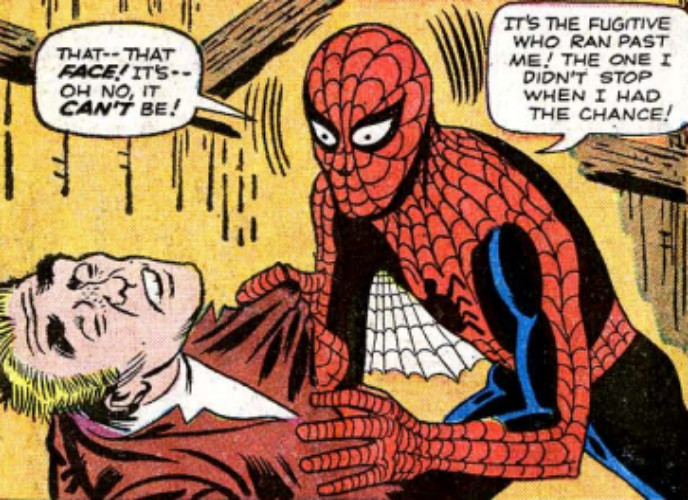
As the issue closes, we're not given much closure beyond "the bad guy is caught and Uncle Ben is avenged." We don’t know where Peter will head next. A blurb promises that "the next issue of Amazing Fantasy" will give us additional Spidey adventures, so it appears Lee and Ditko had some idea where to take the character after the origin, even if that path was set in his own title and not this anthology series. The ending is powerful particularly because it denies us the closure we'd want. Peter is left with a horrible lesson, and if you want to figure out just how he'll put that lesson to use, read up on his next adventures (which, let's be honest, is a brilliant marketing move). Instead of rejoicing that he caught his uncle's killer, Peter recognizes his own culpability in Ben's death, and all the immaturity and unwise decisions rush to greet him. It's an amazingly weighty way to end the issue.
Even here, there's no stated fact that Peter will become a superhero. He's got the proportionate speed, strength, and agility of a spider (as well as, if I'm reading into this correctly, sewing abilities, referencing a spider's penchant for spinning webs). He has the costume, the name, the tragic backstory…we can assume where this is heading. But Peter's left lost, wandering into the night, his own fate unclear to him. Heck, Peter probably doesn't even care. He's left stunned by the revelation that Ben's death is, partially, his fault. There's no swearing to keep similar tragedies from befalling other people, no promises on Ben's grave to fight the good fight, no decision to bring villains and criminals to justice. There's just a boy, a very bright, powerful boy, who's just endured the darkness he tried filtering out by putting on a mask.
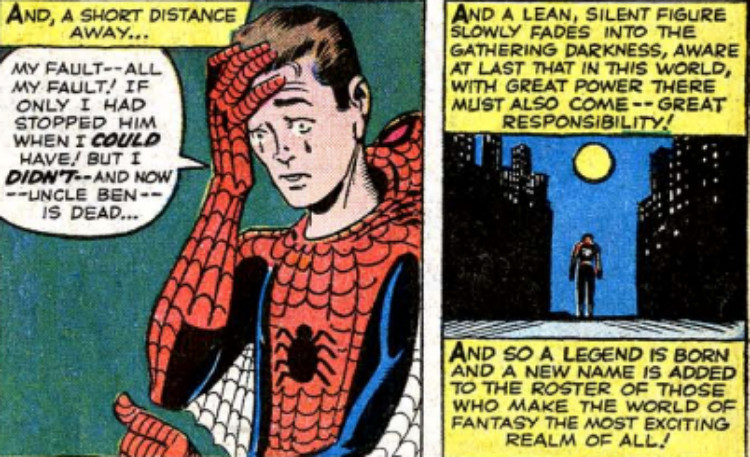
There's a lot to soak in across these 11 pages. The dialogue can feel stilted, but that's just a Stan Lee trademark. To this day, Amazing Fantasy #15 remains a quintessential issue, Superhero Origin Story Telling 101 for all you aspiring writers out there. Take a sympathetic character, give them powers, give them incentive, maybe turn their worldview on its head through an event or tragedy, offer them an organic reason to use their powers for the betterment of humanity. At its heart, Amazing Fantasy #15 isn't only the origin of Spider-Man but the origin of Peter Parker. We meet the boy we'll watch grow into a man. We witness him learn a painful reality that turns his world upside down without requiring him to hang from a ceiling. We see who he is and who he becomes…and we watch, hopefully gracefully, as he realizes who he becomes isn't enough and that he must obtain a level of maturity matching the amazing powers he's been gifted. Because with great power…
Well, you know the rest.